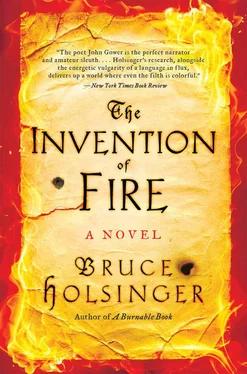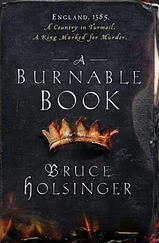Bruce Holsinger - The Invention of Fire
Здесь есть возможность читать онлайн «Bruce Holsinger - The Invention of Fire» — ознакомительный отрывок электронной книги совершенно бесплатно, а после прочтения отрывка купить полную версию. В некоторых случаях можно слушать аудио, скачать через торрент в формате fb2 и присутствует краткое содержание. Год выпуска: 2015, Издательство: HarperCollins, Жанр: Исторический детектив, на английском языке. Описание произведения, (предисловие) а так же отзывы посетителей доступны на портале библиотеки ЛибКат.
- Название:The Invention of Fire
- Автор:
- Издательство:HarperCollins
- Жанр:
- Год:2015
- ISBN:нет данных
- Рейтинг книги:3 / 5. Голосов: 1
-
Избранное:Добавить в избранное
- Отзывы:
-
Ваша оценка:
- 60
- 1
- 2
- 3
- 4
- 5
The Invention of Fire: краткое содержание, описание и аннотация
Предлагаем к чтению аннотацию, описание, краткое содержание или предисловие (зависит от того, что написал сам автор книги «The Invention of Fire»). Если вы не нашли необходимую информацию о книге — напишите в комментариях, мы постараемся отыскать её.
The Invention of Fire — читать онлайн ознакомительный отрывок
Ниже представлен текст книги, разбитый по страницам. Система сохранения места последней прочитанной страницы, позволяет с удобством читать онлайн бесплатно книгу «The Invention of Fire», без необходимости каждый раз заново искать на чём Вы остановились. Поставьте закладку, и сможете в любой момент перейти на страницу, на которой закончили чтение.
Интервал:
Закладка:
It was the twenty-eighth day of October, the Feast of the Apostles Simon and Jude. Across the river Nicholas Exton would be swearing the oath and kissing the book at the Guildhall, with the morrow set aside for the new mayor’s Riding to Westminster. My own sad palace felt like a prison, though there was little I could do but wait until the following morning, as I did not want to risk another venture through the streets. In the hall, suffering through a bout of nervous tedium and unable to concentrate on my own verse, I found my eyes wandering to Chaucer’s bulging quire. I had placed it on a side table after he left. He had described the work as a mirror for princes, a discourse on good counsel and the mitigation of violence: needful subjects at the moment.
Looking for distraction I reached for the booklet. The prose was written in the elegant hand of Adam Pinkhurst, which by this point was nearly as familiar as my own.
Heere beginneth Chauceres Tale of Melibee. A yong man called Melibeus, myghty and riche, bigat upon his wyf, that called was Prudence, a doghter which that called was Sophie. Upon a day bifel that he for his desport is went into the feeldes hym to pleye. His wyf and eek his doghter hath he left inwith his hous, of which the dores weren faste yshette.
At the opening of the tale Melibee goes out to the field, leaving his wife and daughter at home. While he is gone his house is invaded by a group of his enemies, his wife assaulted, his daughter wounded grievously and left for dead. Upon his return Melibee finds his daughter at death’s door and vows to take vengeance upon the perpetrators of this violent crime against his family and home. Yet Prudence, his wife, intervenes, counseling forbearance even in the face of such a horrific crime. Following an involved debate between those counselors advising restraint and those arguing for war, Prudence offers a series of learned opinions on the wisdom of good counsel, all of them drawn from the writings of learned authorities: Cicero, Seneca, Plato, as well as the books of Scripture. At the conclusion Melibee decides to stay his hand, even forgiving his family’s attackers at Prudence’s urging.
It took me the large part of two hours to get through the tale, which Chaucer had written in a flat prose rather than in the fair forms of his typical verse: rhymes, couplets, stanzas. Here the style was almost bleak in its plainness, the tale hardly as accomplished as one of his obscene fabliaux. The tale of Melibee was in my judgment a poetical failure, little more than a straightforward translation from his source, and I wondered what possessed him to plan its inclusion among his Canterbury tales.
Yet it could not be denied that the tale was a topical and timely meditation on the nature and perils of counsel-perhaps too timely, as it seemed to capture the raging dispute among the realm’s governing bodies in our own moment with a dangerous precision. The appellant lords lusting for war, the king and his deposed chancellor pushing back, every counselor murmuring one thing in his lord’s right ear, another in his left. Though I had my doubts about Chaucer’s plan to assign himself such a peculiarly artless tale, its inclusion in the pilgrimage collection would constitute a form of counsel in its own right, aimed at instilling the virtues of prudence and discretion in its readers both lordly and common.
As I went to my bed that night, with Brembre’s men still patrolling the house and the priory walls, Prudence’s words remained with me, her proverbial wisdom worming through my thoughts as my eyes shut against the long day. Know your friends from your enemies, shouted truths from whispered lies. Always distinguish good counsel from bad, and ethical counselors from evil ones . . .
In the stillest hours of the night, before I would normally wake from first sleep, I sat rigidly upright, the words of Chaucer’s tale ringing in my ear. In the examining then of your counselor be not blind. . .
Throwing on a heavy cloak, I padded down to the kitchen hearth, where the Coopers kept coals alive through the night, and lit a candle. In the hall I fired two more and positioned them around the quires containing Chaucer’s tale. Spectacles balanced on my nose, I found the portion of the tale that most clearly addressed the quality of counselors. “For trust well that commonly these counselors are flatterers, namely the counselors of great lords,” Prudence was warning her husband. “For they try always rather to speak pleasant words, inclining to the lord’s desire, than words that are true or profitable. And therefore men say that the rich man seldom has good counsel, unless he has it from himself.”
I read on, my heart rushing furiously as my mind gathered suspicions like a demon gathers souls.
“In the examining then of your counselor be not blind. You should also mistrust the counsel of such people as counsel you one thing privately, and counsel you the contrary openly, or whisper the counsel they have given you secretly into other ears. For Cassiodorus says that ‘It is a sleight of hand to hinder you, when he shows to do one thing openly and does the contrary privately.’ Upon that thing you wish to have counsel, absolute truth should be said and observed; this is to say, tell truly your tale. For he that speaks falsely may not well be counseled in the case of which he lies. You should also hold in suspicion the counsel of such people as reveal their counsel to others without your consent.”
When I had finished I stared down at Chaucer’s quires, the shards of deception assembling themselves in my mind.
With tremulous hands I folded my spectacles and returned them to their pouch. The texture and substance of the fine leather on my fingertips was somewhat calming, even as I felt myself begin to question the unquestionable. A pile of nameless prisoners slain with guns. A village massacred. A brash mayor too cowed to confront the magnate responsible for the atrocities. Bands of badged men, flaunting the livery of their master as they commit wanton murder upon the helpless and the innocent.
There was the nut of the thing. Livery and heraldry, the language of lords. I thought of Scrope and Grosvenor. Two lords, each of them enlisting the peers of the realm in claiming the arms he believes are rightfully his. For a man’s livery is inseparable from his name, his honor and belonging, his very soul. A man’s arms are his truth and his troth.
Or are they?
The beginning of wisdom lies in doubt, so Peter Abelard writes. By doubting we come to the question, and by seeking we may come upon the truth. All along I had been seeking, questioning, searching for the truth. Yet had I genuinely opened myself to doubt, to the afflictions and setbacks brought on by a rigorous questioning of the known? Or had I allowed an arrogant confidence in my own dark skills to guide me down a road of false conclusions?
Be not blind . Since that morning in the St. Bart’s churchyard, I had followed an oiled chain of logic, one thing leading to another in a seemingly unbroken series of links and connections. A murder, a mayor, a duke; a maudlyn and a scribe. Corpses, guns, banners, the witnessing of children. A serpent with a burning cord in its fangs, a flashing knife in a dark square. The word of my son. And behind them all two gorged swans before a tree, their shapely necks entwined in a twist of unmistakable culpability. How precious. How neat.
Yet now, as I returned to my bed, a different vision flashed before me, a sad spectacle of ineptitude and error. I saw John Gower, hobbled over a stick, walking blindly along a trail of polished stones, his weakening eyes discerning only what had been arranged for them to see. A king will do anything to stay a king, Gloucester had murmured in my ear at that Kentish keep, an attempt at deflection and intimidation, as I heard it then. I could not be wrong. I could not. Even as I whispered such assurances to myself I sensed their weakness, my will to harvest strong connections from the barren soil of coincidence.
Читать дальшеИнтервал:
Закладка:
Похожие книги на «The Invention of Fire»
Представляем Вашему вниманию похожие книги на «The Invention of Fire» списком для выбора. Мы отобрали схожую по названию и смыслу литературу в надежде предоставить читателям больше вариантов отыскать новые, интересные, ещё непрочитанные произведения.
Обсуждение, отзывы о книге «The Invention of Fire» и просто собственные мнения читателей. Оставьте ваши комментарии, напишите, что Вы думаете о произведении, его смысле или главных героях. Укажите что конкретно понравилось, а что нет, и почему Вы так считаете.












